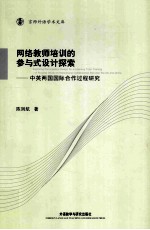

网络教师培训的参与式设计探索 中英两国国际合作过程研究PDF电子书下载
- 电子书积分:13 积分如何计算积分?
- 作 者:陈则航著
- 出 版 社:北京:外语教学与研究出版社
- 出版年份:2011
- ISBN:9787513504799
- 页数:390 页
Chapter 1 Introduction 1
1.1 ABOUT THE RESEARCH 1
1.2 DISTANCE EDUCATION 3
1.2.1 A brief history of distance education globally 3
1.2.2 History of distance education in China 5
1.2.3 Teachers and teacher training in distance education 8
1.3 THE STUDY 10
1.3.1 The context of the study 10
1.3.2 The purpose of the study 14
1.3.3 The significance of the study 16
1.4 OVERVIEW OF THE BOOK 17
Chapter 2 Literature Review 18
2.1 INTRODUCTION 18
2.2 PARTICIPATORY DESIGN 19
2.2.1 Why PD? 19
2.2.2 Challenges for PD 21
2.2.3 Implementation of PD 25
2.2.3.1 PD in software design 25
2.2.3.2 PD in education 27
2.2.3.3PD in e-learning 29
2.2.4 Influential factors of PD 32
2.2.4.1 Collaboration and cooperation in team work 32
2.2.4.2Types of teams and team roles 38
2.2.4.3 Team work strategies 40
2.2.4.4 Culture and team work 44
2.2.4.5 Intercultural communication competence and team work 49
2.2.5 Summary 53
2.3 E-TUTOR TRAINING 54
2.3.1 e-Tutors as teachers 54
2.3.1.1Theory basis for teacher education 54
2.3.1.2Models in teacher edueation 61
2.3.1.3Theories and models for teacher education in China 64
2.3.1.4 Distance teacher education 65
2.3.2 e-Tutors and e-learning 68
2.3.2.1 e-Learning 68
2.3.2.2 e-Learning design:process and pedagogy 71
2.3.23 e-Learning in teacher education 74
2.3.3 e-Tutor training 76
2.3.3.1 Roles and competences of e-tutors 76
233.2 e-Tutor training models and pedagogies 79
2.3.4 Culture and pedagogy 81
2.3.4.1 Authority and autonomy 82
2.34.2 Harmony and critieality 83
2.3.4.3 Collectivism and individualism 84
2.4 THE THEORETICAL FRAMEWORK 85
2.5 SUMMARY 86
Chapter 3 Research Methodology 88
3.1 INTRODUCTION 88
3.2 CHOICE OF RESEARCH METHODOLOGY 89
3.2.1 Theoretical paradigms 89
3.2.2 Research approach 91
3.3 RELIABILITY AND VALIDITY 95
3.4 RESEARCH CONTEXT 98
3.4.1 Phase 1 e-ELT Training Project—informing methodology 98
3.4.2 Phase 2 e-Educator Training Project—the main study 101
3.5 DISCUSSION OF MY ROLE 103
3.6 RESEARCH DESIGN 106
3.6.1 Research questions 106
3.6.2 Subjects 107
3.6.3 Research process 108
3.6.4 Research instruments 109
3.6.4.1Biographical information questionnaire 109
3.6.4.2Interview 109
3.6.4.3 Reflective journal 112
3.6.4.4 Workshop audio recording 113
3.6.4.5 EB Questionnaire 114
3.6.5 Changes to the research design 116
3.7 DATA ANALYSIS 120
3.7.1 A brief history of AT 121
3.7.2 Implementation of AT 124
3.7.3 Use of AT in this study 125
3.8 ETHICAL ISSUES 126
3.9 SUMMARY AND CONCLUSION 127
Chapter 4 Understanding the Context 128
4.1 INTRODUCTION 128
4.2 THE ORGANIZATION OF THE PROJECT 131
4.2.1 Project structure 131
4.2.2 Curriculum of the e-Educator training module 132
4.2.3 Approach of participants collaboration 135
4.2.4 Building and maintaining a community within the project team 136
4.3 MEETING THE PARTICIPANTS 137
4.3.1 The project team 137
4.3.1.1 The UKU participants 137
4.3.1.2 The ChUB participants 139
4.3.1.3 Summary 140
4.3.2 Theme groups 141
4.3.2.1 Biographical/background information about participants in groups 141
4.3.2.2 Motivation 144
4.3.2.3 ICC 145
4.3.2.4 Beliefs in teachingand learning 153
4.3.2.5 EB 175
4.3.2.6 Summary and prediction 183
Chapter 5 The PD Process and the Influential Factors 190
5.1 INTRODUCTION 190
5.2 SUBJECT 192
5.2.1 Expertise and status 192
5.2.2 Motivation 195
5.2.2.1 Personal motivation 195
5.2.2.2 Professional motivation 198
5.2.2.3 Demotivating factors 200
5.2.3 Beliefs and approaches 202
5.2.4 ICC 205
5.2.4.1 Group A 205
5.2.4.2 Group B 206
5.2.4.3 Group D 207
5.2.4.4 Group E 209
5.2.5 Personality and culture 209
5.3 INSTRUMENTS 213
5.3.1 Asynchronous communication methods 213
5.3.1.1 Email 214
5.3.1.2 Discussion forum 215
5.3.2 Synchronous communication methods 216
5.3.3 Rapid prototyping methods 218
5.4 OBJECT 221
5.4.1 Understanding the project objectives 221
5.4.2 Understanding the target users 223
5.4.3 Understanding reason for being involved 225
5.5 RULES 226
5.5.1 Cultural/institutional norms 226
5.5.2 Ground rules 228
5.6 COMMUNITY 231
5.6.1 Working mode 232
5.6.2 Atmosphere 237
5.6.3 Team work strategies 240
5.6.3.1 Task completion 241
5.6.3.2 Social aspect 246
5.7 DIVISION OF LABOUR 252
5.7.1 Defining roles 252
5.7.2 Roles within groups 253
5.7.3 Role of technologists 256
5.8 SUMMARY AND FURTHER DISCUSSION 260
5.8.1 Summary of predictions and actual performance 260
5.8.2 Further discussion of AT framework 266
5.9 CONCLUSION 270
Chapter 6 e-Tutor Training Pedagogy from PD Process 272
6.1 INTRODUCTION 272
6.2 PROCESS AND OUTCOME OF GROUP DESIGN 273
6.2.1 Designs as a result of similar beliefs in teaching and learning 275
6.2.1.1 Design principle 1:Experiential learning 275
6.2.1.2 Design principle 2:Reflective learning 280
6.2.1.3 Design principle 3:Social constructivist approach 283
6.2.1.4 Design principle 4:Personalized learning 285
6.2.1.5 Design principle 5:Interactive and visual learning 287
6.2.2 Designs as a result of negotiation of different beliefs 291
6.2.2.1 Beliefs in teaching and learning and its influence 291
6.2.2.2 EB and its influence 309
6.2.3 Summary and discussion 314
6.3 SUMMARY AND CONCLUSION 318
Chapter 7 Conclusions 319
7.1 INTRODUCTION 319
7.2 SUMMARY OF MAJOR FINDINGS 320
7.2.1 Influences on the PD process 320
7.2.1.1 Rules 322
7.2.1.2 Community 326
7.2.2 About e-tutor training 328
7.3 CONTRIBUTIONS OF THIS RESEARCH 330
7.4 IMPLICATIONS FOR FUTURE USE OF PD FOR THE DEVELOPMENT OF E-LEARNING 332
7.5 LIMITATIONS OF THE STUDY AND RECOMMENDATIONS FOR FUTURE RESEARCH 337
7.5.1 Possible limitations in relation to research methodology 337
7.5.2 Recommendations for further research 340
7.6 CONCLUSION 342
References 344
Appendices 371
Appendix 3.1 Biographical/Background Information 371
Appendix 3.2 Interview Guide:Beliefs in Teaching and Learning 373
Appendix 3.3 Epistemological Beliefs Questionnaire 375
Appendix3.4 Reflective Journal Guide 381
Appendix3.5 Group InterviewGuide 383
Appendix3.6 Interviews with Technologists 384
Appendix 3.7 Interviews with ChUB Coordinators 385
Appendix 3.8 International Profiler Descriptor 386
Appendix 4.1 Schedule for Workshop in March,2006 389
Appendix4.2 Schedule for Workshop in August,2006 390
- 《培智学校义务教育实验教科书教师教学用书 生活适应 二年级 上》人民教育出版社,课程教材研究所,特殊教育课程教材研究中心编著 2019
- 《党员干部理论学习培训教材 理论热点问题党员干部学习辅导》(中国)胡磊 2018
- 《剑桥国际英语写作教程 段落写作》(美)吉尔·辛格尔顿(Jill Shingleton)编著 2019
- 《卓有成效的管理者 中英文双语版》(美)彼得·德鲁克许是祥译;那国毅审校 2019
- 《国际经典影像诊断学丛书 消化影像诊断学 原著第3版》王振常,蒋涛,李宏军,杨正汉译;(美)迈克尔·P.费德勒 2019
- 《危险化学品经营单位主要负责人和安全生产管理人员安全培训教材》李隆庭,徐一星主编 2012
- 《教师新观念》王丽琴主编;吕萍,朱爱忠,严红等编委 2019
- 《教师教育系列教材 心理学原理与应用 第2版 视频版》郑红,倪嘉波,刘亨荣编;陈冬梅责编 2020
- 《国家教师资格考试辅导教材 思维导图全解 教育教学知识与能力 小学》师大教科文教材编写组 2020
- 《住院医师规范化培训 麻醉科模拟试题及精析》住院医师规范化培训考试宝典编委会编 2019
